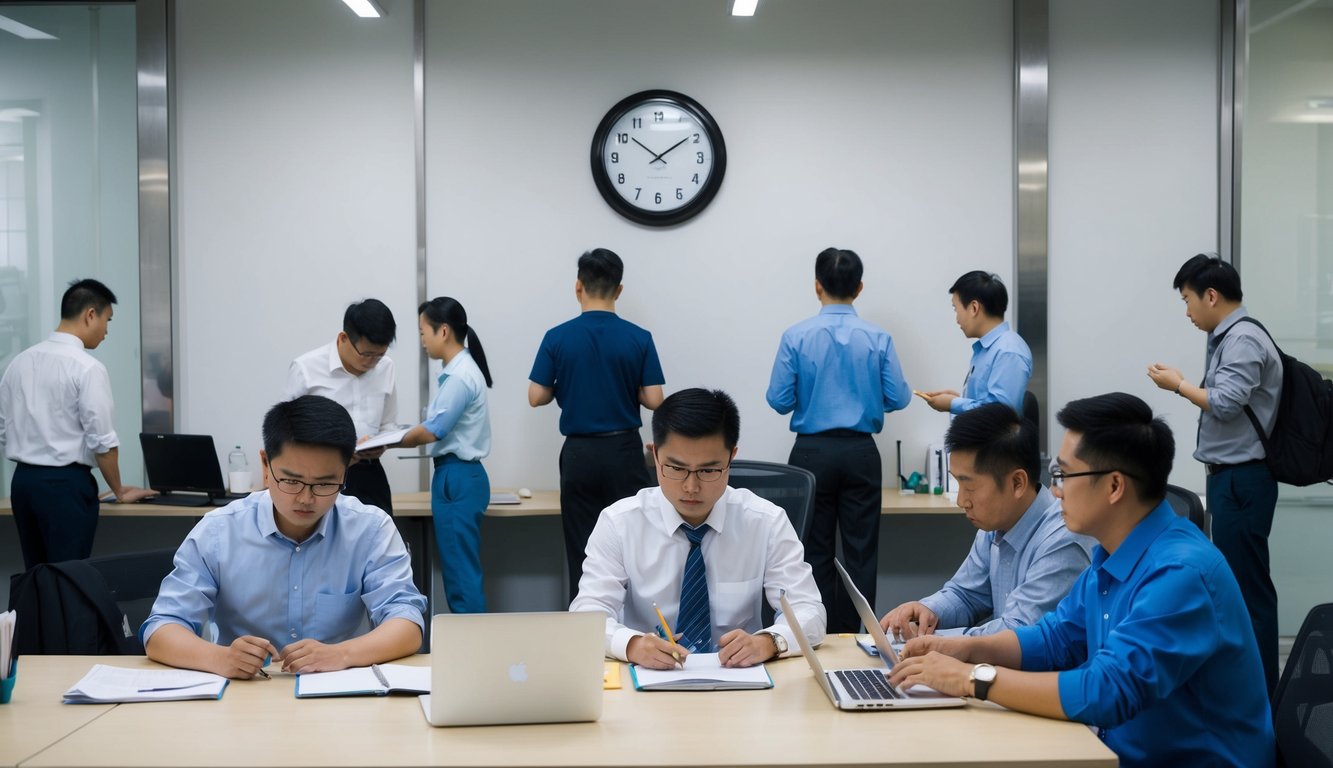Is overtime legal in China? Yes, but with important limits that protect workers! Chinese law allows overtime but requires employers to pay more for your extra hours. The standard workweek is 40 hours, and anything beyond that means higher pay (up to triple your normal wage on holidays!).
Many workers don't know their rights when the boss asks them to stay late. Even China's famous "996" schedule (working 9am-9pm, six days weekly) was recently declared illegal.
Your time is valuable, and Chinese law agrees! Read on to discover exactly what overtime rights you have and how to protect yourself from unfair work practices.
China's Overtime Laws: The Basics

China has specific rules about working hours and when companies must pay extra for overtime. These laws aim to protect workers while allowing businesses to meet their needs.
Standard Working Hours vs. Legal Overtime
In China, the standard workweek is 40 hours, typically spread across five 8-hour days. This is called the Standard Working Hour System. Anything beyond these hours counts as overtime work.
Chinese labor law recognizes three different work hour systems:
- Standard Working Hour System: 8 hours per day, 40 hours per week
- Comprehensive Working Hour System: Hours calculated over a longer period
- Flexible Working Hour System: No fixed daily hours for certain positions
When you work beyond standard hours, your employer must pay overtime. The rates are the following:
- 150% of regular wages for overtime on normal workdays
- 200% for work on rest days
- 300% for work on statutory holidays
Maximum Overtime Limits in Chinese Law
Chinese labor law sets clear limits on how much overtime you can work. Companies can't ask you to work more than 3 extra hours in a single day. The monthly overtime cap is 36 hours.
Some industries might get special permission to exceed these limits during busy periods. However, this requires approval from labor authorities.
Many regions in China have their own rules about overtime. Shanghai, for example, doesn't distinguish between overtime regulations for managers and regular employees.
Despite these legal protections, overtime violations are common in some industries. The government has been working to improve enforcement of these laws to protect worker rights and prevent burnout.
Also, explore our guide titled China Working Conditions Overview: The Reality of Labor to see how these rules fit into the broader workplace landscape.
Overtime Pay Requirements in China

Chinese labor laws require employers to pay extra compensation when employees work beyond standard hours. These regulations protect workers and ensure fair payment for additional time worked.
Mandatory Pay Rates (Weekday, Weekend, Holiday)
In China, different overtime rates apply based on when you work extra hours.
For weekday overtime, you must receive 1.5 times your normal wage for any hours worked beyond the standard 8-hour workday.
Weekend overtime has higher rates. When you work on your rest days (typically weekends), employers must pay you at least 2 times your regular hourly wage. Holiday overtime comes with the highest compensation.
If you work during statutory holidays like Chinese New Year or National Day, you're entitled to 3 times your normal pay rate. These rates are mandatory across China.
Your employer cannot pay less than these minimum rates, regardless of your position or company size.
Calculating Legal Overtime Compensation
To figure out your overtime pay, you first need to know your hourly wage. Divide your monthly salary by 21.75 working days, then by 8 hours.
For example:
- Monthly salary: 5,000 RMB
- Hourly rate: 5,000 ÷ 21.75 ÷ 8 = 28.74 RMB per hour
- Weekday overtime: 28.74 × 1.5 = 43.11 RMB per hour
- Weekend overtime: 28.74 × 2 = 57.48 RMB per hour
- Holiday overtime: 28.74 × 3 = 86.22 RMB per hour
Important to remember: All overtime hours must be tracked and paid.
There's no distinction between managers and regular employees in overtime regulations. You're entitled to these rates regardless of your position.
After learning about legal overtime limits, discover all employer responsibilities in our China Employer Obligations: A Full Guide for Compliance in 2025 for complete regulatory coverage.
China's Three Official Work Systems
China has three different work hour systems.
Each system has its own rules about overtime pay. Understanding these systems can help you know your rights as a worker.
1. Standard Work Hour System
This is the most common system in China.
Under this system, you work 8 hours per day and 40 hours per week. Any work beyond these hours counts as overtime. Your employer must pay you extra for overtime work.
2. Comprehensive Work Hour System
This system calculates your work hours over a longer period, like a month or a quarter. Your employer must get approval from labor authorities to use this system.
Even with this system, you can't work more than 36 extra hours in a month.
3. Flexible Work Hour System
This system is for special jobs where fixed hours don't make sense. It's used for managers, salespeople, and creative workers.
In this system, overtime isn't strictly tracked or paid. Your employer needs special permission to use this system.
For any overtime work, your employer should get your written consent.
They must also record your overtime hours in their attendance system. This rule helps protect you from being forced to work extra hours without proper payment.
Employee Rights and Employer Obligations

Both workers and companies have clear rights and duties when it comes to overtime in China. Understanding these can help you protect yourself as an employee or stay compliant as an employer.
Consent Requirements for Overtime Work
You must give written consent before working overtime in China. This is a key protection for workers. Your employer cannot force you to work extra hours without your agreement.
Companies must record all overtime hours in their attendance system. This helps ensure you get paid correctly. Your labor contract should clearly state how overtime works and how you'll be paid for it.
If you work overtime, you're entitled to at least 150% of your basic salary on regular workdays. The rate goes up for weekends and holidays. Your employer must either pay you or give you time off as compensation.
Reporting Illegal Overtime Practices
You have the right to report unfair overtime practices. If your company makes you work more than the legal limit of 36 hours per month, you can take action.
Start by talking to your HR department or manager. If that doesn't work, you can file a complaint with the local labor bureau. Keep good records of your work hours as evidence.
China's labor laws protect your annual leave rights too. Companies can't make you work during your legally protected vacation time.
If your employer punishes you for not working illegal overtime, you can seek help from labor officials. Many workers worry about losing their jobs if they speak up.
Remember that the law is on your side. Labor bureaus can fine companies that break overtime rules.
Learn how to identify violations with our guide: How to Check if a Chinese Factory is Following Labor Laws?
Common Overtime Issues in China
Despite regulations limiting overtime, many Chinese workers face challenges with excessive work hours. Several issues arise when companies don't follow legal overtime limits or fail to provide proper compensation.
The "996" Culture and Government Response
The "996" work schedule (9am to 9pm, 6 days a week) has become common in many Chinese companies, especially in tech. This schedule forces employees to work about 72 hours weekly, far beyond the legal limits of 36 overtime hours per month.
Many big tech companies have promoted this intense work culture. Some bosses even praise it as showing dedication. But workers have pushed back against these practices. The Chinese government has recently taken steps to address this problem.
Courts have ruled that the 996 schedule is illegal. The Supreme People's Court called excessive overtime "labor exploitation" in 2021.
You should know that companies can face penalties for breaking overtime laws. However, enforcement remains inconsistent across different regions and industries.
Industry-Specific Overtime Practices
Overtime issues vary greatly across different sectors in China:
Manufacturing: Factory workers often face the most severe overtime problems. During busy seasons, you might be asked to work 12-hour shifts for weeks without proper breaks or pay.
Tech Industry: Besides the 996 culture, many tech companies use "flexible" work arrangements that don't count overtime hours properly.
Service Sector: Restaurant and retail workers frequently work split shifts or extended hours without overtime compensation.
The impact on your work-life balance can be significant. Many workers report health problems, family strain, and burnout from excessive overtime.
Some companies use creative methods to avoid paying overtime, like:
- Classifying regular workers as managers (who may not qualify for overtime)
- Using unofficial "voluntary" overtime systems
- Creating alternative work hour systems that hide actual overtime
Enforcement and Penalties
China's overtime regulations exist on paper, but enforcement varies widely across the country.
Employers who break these rules can face several consequences, though how strictly these rules are enforced depends on many factors.
Regional Variations in Overtime Enforcement
Labor authorities in major cities like Shanghai, Beijing, and Guangzhou tend to monitor overtime more strictly than in smaller cities or rural areas.
You might notice that coastal regions with more foreign investment typically have stronger enforcement practices.
In special economic zones, authorities may be more lenient with certain industries deemed crucial for economic growth.
Many tech companies in Shenzhen, for example, have historically faced less scrutiny despite their "996" work culture (9am-9pm, 6 days per week).
Local labor bureaus have different priorities and resources. Some focus more on workplace safety while others target wage violations. This creates an uneven enforcement landscape across China.
Consequences for Violating China's Overtime Laws
If you violate China's overtime regulations as an employer, you may face these penalties:
- Financial penalties: Fines ranging from 1-5 times the amount of unpaid wages
- Back payment obligations: You must pay workers all owed overtime compensation
- Administrative warnings from local labor bureaus
- Negative social credit impacts for your business
Repeated violations can lead to more serious consequences. Your company might be placed on public blacklists that affect your ability to bid on government contracts.
Workers can file complaints with local labor bureaus or pursue arbitration. The statute of limitations for most overtime claims is one year, giving employees limited time to seek compensation for violations.
Conclusion
Overtime is legal in China but comes with strict rules about hours and pay. Companies must limit overtime to 3 hours daily and 36 hours monthly, paying 150-300% extra depending on when you work. All overtime must fit within one of China's three work systems.
Despite these protections, many Chinese companies (especially in tech) ignore these rules. The good news? The government is cracking down on violations like the infamous "996" schedule.
Need help with overtime issues in China? Contact China Legal Experts today for professional guidance tailored to your situation!
Frequently Asked Questions
What is the legal maximum working hours in China?
The legal maximum standard working hours in China is 8 hours per day and 44 hours per week. This is set by China's Labor Law.
Chinese employers can extend working hours if needed, but only after consulting with workers or unions. The law limits overtime to 36 hours per month. Working beyond these limits is technically illegal, though enforcement varies.
How much is overtime in China?
Overtime pay in China follows specific rates based on when the extra work happens.
For overtime on regular workdays, employers must pay 1.5 times the normal wage rate. Weekend overtime requires double pay (2 times the normal rate).
For overtime on statutory holidays, employers must pay triple the normal wage (3 times the regular rate).
What is the 3-hour rule in China?
The 3-hour rule means employers can extend working hours by up to 3 hours on a given day when needed. This must be done for special reasons.
You must agree to this extension of work hours. Your employer can't force you to work beyond this daily limit. This rule exists within the broader limit of 36 overtime hours per month.
Does China have a 40 hour work week?
Yes, China officially has a 40-hour standard work week. This typically means five 8-hour workdays.
The Chinese government revised the Labor Law to reduce the standard from 44 to 40 hours in 1995. Any work beyond 40 hours in a week should be considered overtime and paid at higher rates.
What is the 4 2 1 rule in China?
The 4 2 1 rule isn't about labor law but refers to China's family structure after the one-child policy. It means 4 grandparents and 2 parents depending on 1 child. This demographic pattern affects the workforce and creates pressure on young workers.
It's not directly related to overtime regulations but influences work culture and economic pressures in Chinese society.
How are workers compensated for overtime according to Chinese labor law?
Workers must receive extra pay for all overtime hours according to fixed rates set by law. For overtime on weekdays, you should get 150% of your normal wage.
Weekend overtime earns you 200% of your regular pay. Holiday overtime requires 300% of your standard wage. Your employer must pay these rates and cannot substitute time off instead of proper overtime
Subscribe to receive updates
Subscribe to receive the latest blog posts to your inbox every week.




.jpg)
.jpg)
.jpg)